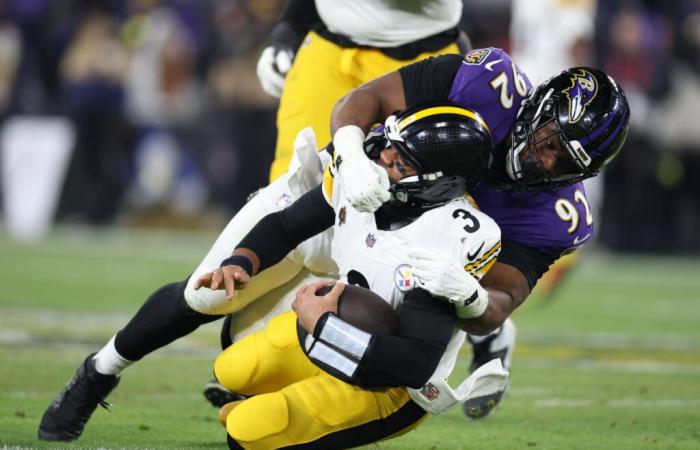When did it hit you that this weekend’s wild-card games really, well … stunk? Was it when Justin Herbert threw his fourth interception? When Pittsburgh punted for the fourth consecutive time to open the game? When Denver three-and-outed over and over and over again?
Thank heaven for the Tampa Bay-Washington Divisional Doink which halted a streak of four straight flat-out ugly Football games. Without that, we would have had an unrelenting weekend of awful pro football … a stark contrast to the two College Football Playoff instant classics that led into the NFL playoffs.
This opening round of the NFL playoffs — don’t call it “Super Wild Card Weekend” anymore, the NFL quietly trashed that awful branding — actually replicated the first round of the CFP in all the wrong ways. In each of the first four games, three of which were certified blowouts, the home team dusted the visitors without a whole lot of trouble, or drama. All four winners captured the leads they’d never surrender in the first half — sometimes early (Philadelphia, 101 seconds into the game) and sometimes late (Houston, 58 seconds before halftime). By the end of all four games, the announcers were already previewing the next round’s matchup long before the clock hit zeroes.
The simple truth about football, at both the college and pro levels, is this: The gap between the elite teams and everyone else is vast and virtually unbridgeable. (And the ability of the Chargers to saw off their own feet remains unmatched.) Only the single-game variance of football allows for unexpected results to occasionally crop up; if the Bills played the Broncos in a best-of-seven, Denver would be lucky to force a Game 6.
The six-game wild-card round has variances, but it’s trending toward a familiar pattern. Since the playoffs grew to six wild-card weekend games in 2020, the higher seed tends to win, and win by an increasingly large margin.
-
In 2024, there will be a maximum of two one-possession games, if Minnesota and the Rams keep it close Monday night. The higher seed has won four of five so far.
-
In 2023, only one of the opening-round games was closer than 14 points. (The Lions defeated the Rams, 24-23.) The higher seed won five of six.
-
In 2022, there were actually four one-possession games, including Jacksonville’s rally from down 27-0. The higher seed won four of six.
- -
In 2021, there were two one-possession games, and the higher seed won five of six.
-
In 2020, when the playoffs began, there were three-one possession games. The higher seed won only two of six, but 2020 was a weird year that shouldn’t count for anything anyway.
What does all this mean for the playoffs going forward? Well, in the same way that adding ice cubes to your beer isn’t going to do much for the flavor, adding more teams to the playoffs won’t do anything to the competitive balance of the postseason. Because, let’s remember … you’re not adding those teams to the top of the bracket.
Combine the NFL playoffs’ inevitable expansion to 16 teams with the overall league’s inevitable expansion to 18 games, and you can see where we’re heading — more playoff blowouts, more less-than-qualified teams in the postseason.
The argument for an expanded playoff is obvious: more teams = more fans invested in the playoff race = more revenue. But remember how the playoff “race” went this year — only three teams were still in contention in Week 18 that didn’t make the postseason, and the Falcons, Dolphins and Bengals didn’t exactly spend this season covering themselves in glory only to fall short at the last second. The NFL has a whole lot of bad teams every year, and allowing two more of them to slip into the postseason will do nothing to improve the overall product.
There’s always the chance you’ll get a miracle finish like Washington-Tampa Bay. But the likelihood in every wild-card weekend going forward is that the annual Saturday afternoon Texans slapfight will be the rule, rather than the unwatchable exception.
Related News :
